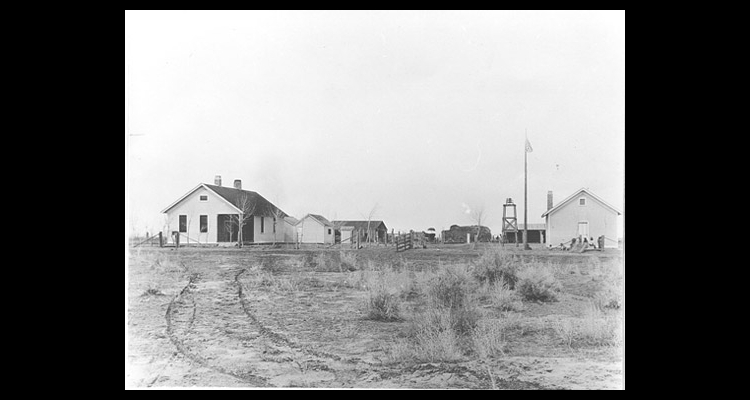Walter A. Van Voorhis
Walter A. Van Voorhis came to the Fallon Paiute Reservation as government agent in January 1909, from Taholah, Washington, where he had served in that capacity on the Quinault Reservation. He was accompanied by his wife, Lillie, baby son Bruce, his mother-in-law Alice Simson, and newest arrival Wayne—born December 9, 1909.
Van Voorhis' first major project was to provide a domestic water supply for the reservation's Fallon Day School. Walter Busch of the firm Busch & Henriksen installed a cement cistern with a 110 barrel capacity that used filtered ditch water. Almost immediately this cistern proved inadequate for the needs of the school. A larger, two-thousand-gallon cistern with a gasoline engine pump not only solved the domestic water problem, but also aided in fire protection.
Low crop production was another concern for Van Voorhis. In the first years under his supervision, crop yield dramatically improved. In 1911 he claimed a sixty percent increase in yield over previous years.
Van Voorhis also oversaw the building of the Baptist Indian Mission, a privately funded project built near the day school. It served as a church for the community and a home for the missionary volunteers.
Perhaps his most important and lasting contribution was the establishment of a tribal police unit. Van Voorhis believed that Paiute officers would be more readily accepted by reservation members than would white officers. Two policemen were initially employed—their salaries were paid by Churchill County and the U.S. government. Today, the Fallon Tribal Police remain a viable law enforcement agency on the Fallon Reservation.
In 1917, after eight years, Van Voorhis left the Stillwater Reservation, transferring to the Fort Washakie Reservation in Wyoming. As it turned out this was not a good move. After nine months at Fort Washakie, Van Voorhis resigned and returned to Fallon, accepting a position with the I.H. Kent Company.
Van Voorhis died of pneumonia on January 8, 1919, at his home in Fallon. He was survived by his wife Lillie and sons, Wayne and Bruce. The Van Voorhis boys were destined to die heroes in WWII. The youngest son, Wayne, was a survivor of the Bataan Death March. He died of malaria in a Japanese prison camp in July 1942. Lt. Bruce Van Voorhis died from injuries suffered on a bombing mission, for which he was posthumously awarded the Congressional Medal of Honor. Voorhis Field at the Naval Air Station in Fallon, Nevada, was named in his honor.
Article Locations
Related Articles
None at this time.
Further Reading
None at this time.

